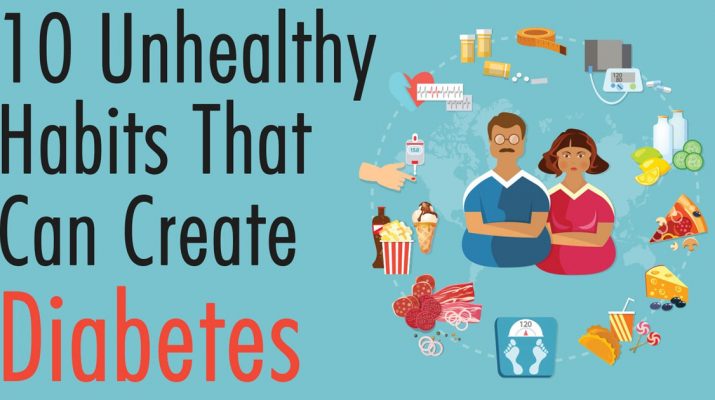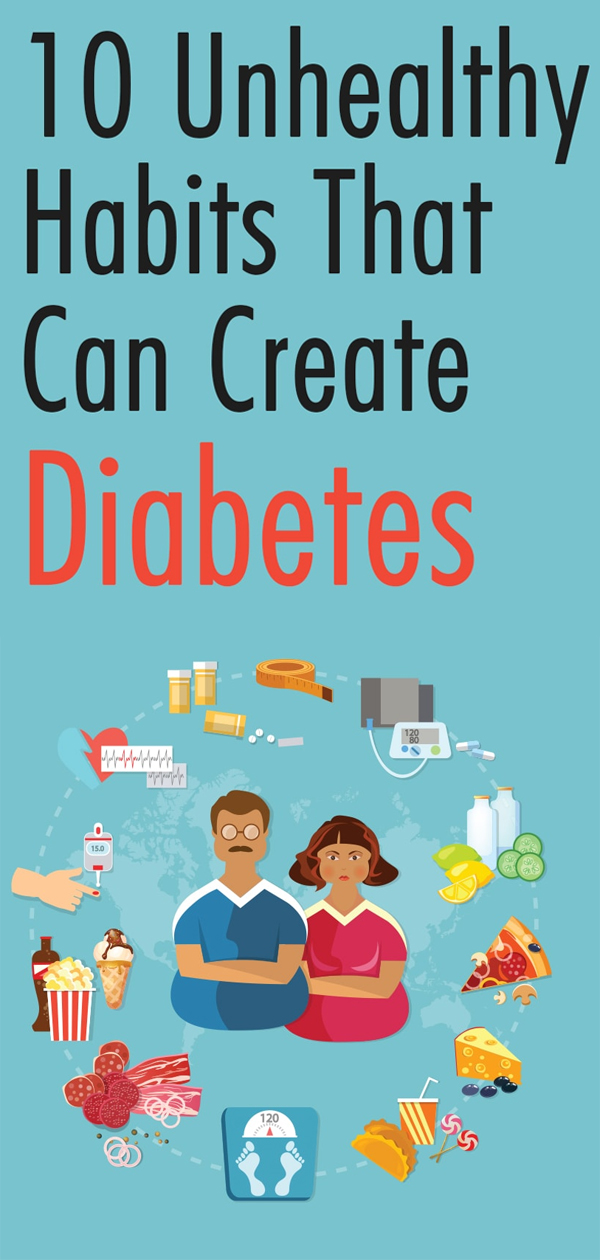In the past, the only ones at risk for diabetes – particularly type 2 diabetes – have been those who struggle with obesity or have a history of the disease in the family. But much has changed these days, especially when it comes to people’s lifestyle and habits.
Today, cases of diabetes are rising. At least 1.5 million people in the U.S. are diagnosed with the disease every year, as per the Diabetes.Org. This chronic condition is becoming a global epidemic because of people’s diet, lifestyle, and unhealthy routines. Here are some habits you might not realize can create diabetes.
Here Are 10 Unhealthy Habits That Can Create Diabetes
“The sooner people find out they have prediabetes and take action, the better their chances of preventing type 2 diabetes.” – Dr. Ann Albright
1. You’re Not A Breakfast Person
Are you the type of person who skips breakfast?
- When you don’t eat your morning meals, you’re actually disrupting the functions of the insulin in your body.
- This, in turn, can cause your blood sugar levels to be erratic.
- It may also trigger the decline of the beta-cell function that’s important for turning glucose into energy.
Now, the effects of a higher blood sugar level will be harder to correct as the day progresses. If you’ve made it a habit to skip breakfast, you’ll raise your risk for developing diabetes. This is because you’ll likely indulge in more high-sugar foods to get through the day.
Experts say that it’s much better to skip dinner meals than your morning meals. A study in the journal Diabetes Care learned that people with diabetes, who like eating a heavy breakfast and light dinner, lowered their blood sugar levels by 20 percent compared to those who had a light breakfast and heavy dinner.
2. You Don’t Hydrate As Much
There are loads of benefits to drinking at least two liters of water every day. One of them is that you cut your risk for high blood sugar. If you drink at least eight glasses of water daily, you’ll lessen your risk for hyperglycemia by 21 percent.
- Water is vital to the functions of the liver and kidneys to flush out the toxins.
- If your body is not hydrated well, it won’t be able to do its work properly. Your blood sugar may rise as a result.
- Experts believe that people who are overweight and lack of energy are less hydrated.
- Their risk for diabetes development therefore increases.
Worse, if you prefer sugary drinks over water, you’ll gain calories that have no nutritional value. These calories do nothing but raise your glucose level.
3. You’re Not Fond Of Eating Fruits Vegetables Or You’re Eating The Wrong Produce
Fruits and vegetables are very important to any diet, especially if you want to keep your weight ideal. These products provide the fiber that keeps your stomach full and helps your blood sugar level off.
- If you don’t have fruits and vegetables in your meals, your body loses out on those beneficial fibers.
- It’s also important to pick the right types of produce. For example, potatoes, corn, and peas are rich in carbohydrates that might spike your blood sugar levels.
- You’ll want to have more green and leafy vegetables like spinach, kale, and broccoli.
- You should also eat dark-colored fruits like blueberries or cranberries because these are filled with antioxidants that can improve your body’s insulin resistance.
4. You’re Sitting All Day And Don’t Work Out Enough
Many people assume that working out once a day is enough and qualifies as physical activity. But the truth is, if you only exercise for 20 minutes in the morning and then spend most of your waking hours sitting at work, it’s still bad for your health.
- Try to move throughout the day. Otherwise, you could still risk developing diabetes.
- Ideally, the American Diabetes Association recommends a daily exercise of at least 60 to 75 minutes for positive blood sugar management.
- If you’re not getting this much activity, then try performing three-minute exercises away from your desk every 30 minutes.
You can try doing stretches during your break time or walk around the block in your place of work. In any way possitlbe, ensure that you have physical activity throughout your day. The idea is to reduce the overall hours you incur from sitting too much in order to prevent diabetes.
5. You Love To Stay Up Late
Do you like to be awake late at night and on into the wee hours of the morning? It’s high time to change this habit because it may also lead to the development of diabetes.
Experts told Men’s Health that night owls tend to have unhealthy routines. They have late meals or midnight snacks. They may smoke to keep themselves awake and they never try exercising at all.
- Night owls also tend to expose themselves to the artificial lights of their computer, television, and devices.
- Studies have tied these poor habits to the improper regulation of blood sugar levels and lowered sensitivity to insulin.
- To be up later than normal can also contribute to bad sleeping habits, which leads to sleep deprivation.
- When you lack sleep, your body’s metabolism becomes disrupted, which also affects how your body produces and uses insulin.
6. You Reheat Food In The Microwave Using A Plastic Container
You might not realize it but the plastic containers you’re fond of using for storing and reheating leftovers may raise your diabetic risk, according to experts at the New York University Langone Health center. These plastic containers apparently have chemicals like DINP and DIDP that may impact insulin resistance.
These chemicals have already been banned in other countries because of their disadvantages to public health. In countries like the United States, however, plastic manufacturers may only voluntarily choose not to use the chemicals.
For your safety and health, use glass containers to reheat food or store leftovers in the microwave. As much as possible, avoid storing leftovers for more than three days since these won’t be as nutritious anymore.
7. You Don’t Manage Your Stress Well
Stress is already part of life. Every adult who has relationships and responsibilities experiences this. If you don’t know how to manage your stress, it may also be a risk factor for diabetes.
- Experts said that people who are stressed tend to forgo taking good care of themselves.
- They eat unhealthy foods and keep unhealthy habits that directly affect the functions of their organs.
- Their body also releases thousands of stress hormones that alter blood sugar levels.
- One way to alleviate stress is to have a supportive social circle.
- If you’re stressed and you close off your connections to other people, that’s a double whammy and a bad strategy for avoiding diabetes.
According to the Mayo Clinic, social disconnection can lead to depression, which, in turn, becomes another risk factor for diabetes development. It’s not just important, therefore, to have a good diet and lots of exercise or rest. It’s also important to have a positive outlook and good social relationships since depression can trigger hormones that will spike your blood sugar level.
8. You Try To Cut Back On Coffee
Though there are studies that might say coffee is bad for you, there are also studies that offer counter-arguments. For instance, a Harvard research learned that people who drink six cups of coffee daily decrease their risk for diabetes by 33 percent compared to those who don’t drink coffee.
Apparently, a cup of joe has ingredients that can work against insulin resistance, as well as boost your body’s use of glucose. So, if you’re trying to cut down on your coffee drinking, you may actually be taking away the protective and positive effects that caffeine gives to your body.
9. You Don’t Spend Time Outdoors
Are you avoiding going out in the daytime because you don’t want to develop skin cancer? Experts, however, say that you could greatly benefit from being around nature if you don’t want to have diabetes.
- Once in a while, you need to take advantage of the warm glow of the sun and the green space around you.
- These natural resources provide the vitamins and nutrients boost that can help organs like the pancreas function better.
- The pancreas is responsible for producing the insulin that controls your blood sugar.
Several studies have also shown that people who enjoy the outdoors have lower blood sugar levels, blood pressure level, and heart rate. They also have less stress, anxiety, and depression.
10. You Drink Antibiotics When You’re Sick
Antibiotics help your body fight off bacteria, germs, and virus. These drugs are so powerful that their intake must be followed as prescribed so that there are no side effects.
But a study in the Journal of Clinical Endocrinology and Metabolism revealed that the use of antibiotics may raise a person’s diabetic risk by 23 to 53 percent. The researchers theorized that antibiotics may suppress the level of good bacteria in your immune system in the gut, which in turn affects your body’s ability to digest and metabolize sugar.
- The next time you’re under the weather and have been prescribed antibiotics, perhaps ask for alternative treatments from your doctor if you’ve got a history of diabetes.
- Some types of infection may also not respond to an antibiotic treatment, such as the common cold. It would be pointless to take an antibiotic for this illness.
- If it can’t be avoided, ask your doctor about the effects of the prescribed antibiotics to blood sugar.
- Take your blood sugar test often to monitor any changes and side effects of the treatment. This way, you can alert your doctor if it’s causing your glucose levels to spike.
Final Thoughts On Unhealthy Habits That Can Create Diabetes
When you want to prevent diabetes or at least manage to keep this disease under control, the best thing to do is live a healthy lifestyle. Ditching bad habits might be hard to do in the beginning, however, you’ll reap positive effects once you make the changes.
A chronic illness like diabetes requires your full commitment. Ultimately, you alone have full control over what you eat, how much physical activities or rest you take, and what you do to your body that will protect it from this chronic and life-long condition.


